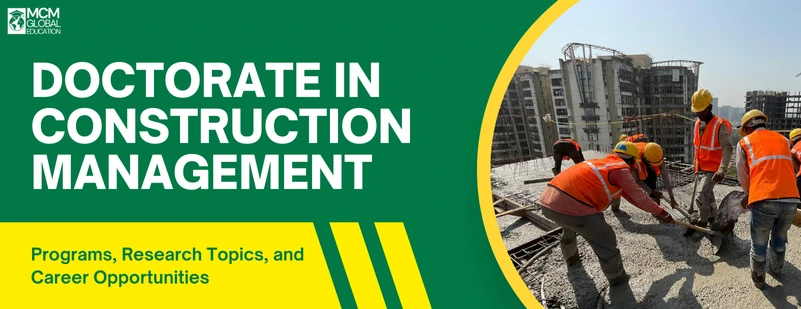A Doctorate in Construction Management is the highest academic credential in the field of construction, combining rigorous research with practical applications. Unlike a master’s degree or MBA, this program emphasizes innovation, advanced project leadership, sustainable practices, and technological integration. With construction rapidly evolving through AI, BIM, robotics, and green technologies, earning a doctorate equips professionals to drive industry transformation, lead academic research, or influence global policy.
If you’re considering a PhD or Doctorate in Construction Management, this guide will cover everything you need to know—eligibility, coursework, research areas, dissertation topics, and career prospects.
Table of Contents
Types of Doctorates in Construction Management
There are multiple doctoral pathways available depending on your career goals:
| Doctorate Type | Focus Area | Best Suited For |
|---|---|---|
| PhD in Construction Management | Research-heavy, academic focus | Aspiring professors, researchers |
| Doctor of Science (DSc) in Construction Management | Applied, technical depth | Industry leaders, innovation-driven roles |
| Doctor of Engineering (EngD) in Construction | Practice-oriented, integrates real-world projects | Senior engineers, consultants, executives |
Most programs last 3–5 years, with part-time and hybrid options available at select universities.
Admissions & Eligibility
Academic Requirements
- Master’s degree in construction management, civil engineering, architecture, or related field
- Minimum GPA of 3.0 (or equivalent international standard)
- GRE/GMAT may be required (varies by university)
Application Components
- Research proposal aligned with faculty interests
- Statement of Purpose (SOP)
- Curriculum Vitae (CV)
- Letters of Recommendation (2–3 academic/industry referees)
Professional Experience
Many universities value applicants with 5+ years of construction or project management experience. This strengthens research proposals by demonstrating industry insight.
Core Curriculum
Doctoral programs in Construction Management combine coursework, seminars, teaching, and dissertation research.
| Course Module | Topics Covered |
|---|---|
| Research Methodology | Quantitative/qualitative methods, data analytics |
| Advanced Project Planning | Lean construction, scheduling, integrated project delivery |
| Construction Economics | Cost modeling, finance, resource optimization |
| Sustainable Construction | Green building systems, life cycle assessment |
| Technology Integration | BIM, AI, IoT, robotics, digital twins |
| Leadership & Policy | Governance, ethics, safety, workforce management |
Research Domains in a Doctorate in Construction Management
Research is the backbone of a doctoral program. Here are the key research areas attracting global attention:
1. Sustainability & Green Construction
- Renewable energy integration
- Low-carbon concrete & eco-materials
- Circular economy & waste reduction
2. Digital & Smart Technologies
- Building Information Modeling (BIM)
- Virtual Design & Construction (VDC)
- IoT-enabled real-time monitoring
3. Artificial Intelligence & Blockchain
- AI-based scheduling & risk prediction
- Blockchain in smart contracts & payment systems
- Robotics for construction safety
4. Lean & Efficient Project Delivery
- Lean construction principles
- Cost engineering frameworks
- Integrated project delivery (IPD)
5. Safety, Human Factors & Mental Health
- Ergonomics in design
- Worker safety and well-being
- Mental health initiatives in construction teams
6. Leadership & Organizational Behavior
- Leadership strategies in megaprojects
- Diversity and inclusion in construction management
- Remote teamwork in global projects
Emerging Trends in Doctoral Research
The construction industry is rapidly evolving with smart technologies and ethical considerations. Current doctoral research trends include:
- Robotics & Cyber-Physical Systems for real-time visualization
- AI ethics and automation—balancing job displacement and efficiency
- Blockchain governance in global construction contracts
- Sustainable smart cities through integrated planning
Choosing Your Research Topic
When selecting a dissertation topic for a Doctorate in Construction Management, consider:
- Alignment with faculty expertise
- Availability of resources and data
- Relevance to future industry challenges
Dissertation Topic Examples
Here are some trending PhD dissertation topics in construction management:
| Category | Sample Topic |
|---|---|
| Smart Technologies | BIM + IoT for real-time project monitoring |
| AI Applications | AI-driven risk assessment in scheduling |
| Sustainability | Circular economy in construction waste management |
| Robotics | Robotic CPS for progress monitoring |
| Human Factors | Mental health interventions for construction workers |
| Blockchain | Blockchain-based contract management |
Career Outcomes After a Doctorate in Construction Management
Graduates of a Doctorate in Construction Management are equipped for leadership across academia, industry, and policy-making.
Academic Pathways
- University professor
- Research scientist
- Author of academic journals/books
Industry Roles
- Chief Project Officer (CPO)
- Construction technology consultant
- Director of sustainability or innovation
Policy & Governance
- Government advisor on infrastructure projects
- Smart city planner
- Sustainability framework developer
Skills Gained During the Program
| Skill Area | Details |
|---|---|
| Research Skills | Critical analysis, publishing in journals |
| Leadership | Managing megaprojects, organizational behavior |
| Technology | BIM, AI, IoT, robotics in construction |
| Policy | Governance, ethics, sustainable regulations |
| Teaching | Academic instruction, curriculum development |
FAQs
Q1. How long does a Doctorate in Construction Management take?
Typically 3–5 years, depending on full-time or part-time study.
Q2. Can I pursue it part-time?
Yes, some universities offer hybrid and part-time options.
Q3. Do I need prior industry experience?
Not mandatory, but professional experience adds value to your research.
Q4. What funding options are available?
Scholarships, research assistantships, and industry sponsorships.
Q5. Is this degree worth it for industry professionals?
Yes, it opens senior leadership, consulting, and global research opportunities.
Conclusion
A Doctorate in Construction Management is more than an academic pursuit—it is a gateway to shaping the future of the construction industry. By specializing in sustainability, AI, robotics, blockchain, or human factors, you can become a thought leader driving innovation and transformation.
Whether your ambition is to teach, research, or lead megaprojects, this doctorate equips you with the skills to make a global impact.























